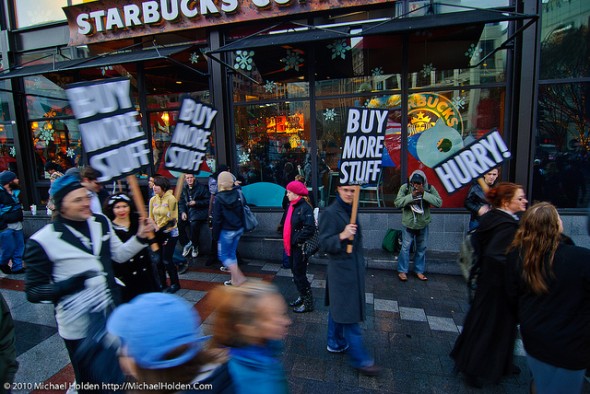Did you shop or boycott stores open on Thanksgiving day? One survey found shoppers did not approve of retailers opening on the holiday and getting a jump start on Black Friday – one of the biggest shopping days of the year. Olin marketing professors weigh in on the ‘Christmas Creep’ phenomenon of deep discount sales creeping into stores earlier each year. The trend may benefit consumers, but it doesn’t guarantee retailers will be in the black at the end of the year, according to our profs.
“Black Friday deals are a classic loss-leader strategy,” says Joseph Goodman, PhD, associate professor of marketing. “Retailers are trying to get these products out in front so they get people into the store. They may lose a few dollars on those particular items, but they will make up the money when people buy two or three other things.”
 “There is some research evidence that indicates consumers are focusing less on material values and more on acquiring experiences. It might be that they are actually shopping for an experience. Research says that when consumers spend money on experiences, they actually end up being happier and more satisfied with their life than when they are purchasing material goods. So there might be a silver lining in all of this. I just wonder how long will it take until Thanksgiving is completely a shopping day and it turns into Black Thursday.”
“There is some research evidence that indicates consumers are focusing less on material values and more on acquiring experiences. It might be that they are actually shopping for an experience. Research says that when consumers spend money on experiences, they actually end up being happier and more satisfied with their life than when they are purchasing material goods. So there might be a silver lining in all of this. I just wonder how long will it take until Thanksgiving is completely a shopping day and it turns into Black Thursday.”
“’Christmas Creep’ has been happening for years and reflects the fact that these retailers are responding to the needs of their market segments,” says Carol Johanek, adjunct professor of marketing. 
“The holiday season, of course, is a key selling time for retailers, and with the time frame being especially short this year between Thanksgiving and Christmas, it is not surprising to see these brands setting up their promotions earlier on the calendar. With our slow recovery, there is less hiring, more stagnated wages and individuals — specifically lower-income, price-sensitive shoppers — love the special promotions, lay-away options and early deals. Although there are studies that show consumers are not happy over the earlier holiday promotions, their behavior says something very different.”
“Retailers have been pushing Christmas décor, merchandising, and promotions earlier and earlier for many years,” notes Martin Sneider, adjunct professor of marketing. “It seems almost quaint now, but there was a time not so long ago when retailers waited to take markdowns until AFTER Christmas. Now price busting begins in early November and reaches its twin peaks during Thanksgiving week and the week BEFORE Christmas.”
 “With the media spotlight on retailing during Thanksgiving weekend, price cutting and door busters are forms of MAD (Mutual Assured Destruction) where retailers try to outdo one another by slashing gross profit to unsustainable levels. All want sales momentum going into the holiday season, which accounts for a huge percentage of retailer sales and profits. With a much shortened holiday shopping season – a very late Thanksgiving means four or five fewer shopping days this year, retailers are starting even earlier.”
“With the media spotlight on retailing during Thanksgiving weekend, price cutting and door busters are forms of MAD (Mutual Assured Destruction) where retailers try to outdo one another by slashing gross profit to unsustainable levels. All want sales momentum going into the holiday season, which accounts for a huge percentage of retailer sales and profits. With a much shortened holiday shopping season – a very late Thanksgiving means four or five fewer shopping days this year, retailers are starting even earlier.”
 “If no one does anything, then one retailer may correctly think that he will gain competitive advantage by engaging in this ‘Christmas Creep’,” says Chakravarthi Narasimhan PhD, the
Philip L. Siteman Professor of Marketing. “But, if everyone thinks that way, everyone follows suit and the industry as a whole may or may not be better off.”
“If no one does anything, then one retailer may correctly think that he will gain competitive advantage by engaging in this ‘Christmas Creep’,” says Chakravarthi Narasimhan PhD, the
Philip L. Siteman Professor of Marketing. “But, if everyone thinks that way, everyone follows suit and the industry as a whole may or may not be better off.”
“If consumers open their wallets more and spend more because of all this, then collectively perhaps the retailers may become better. But, if the total retail dollars do not increase sufficiently, then most retailers may be worse off because of cost increases in going early as well as deeper discounts that may follow.”
Neil Schoenherr contributed to this post.
Photo credit: Michael Holden, Flickr, Creative Commons



